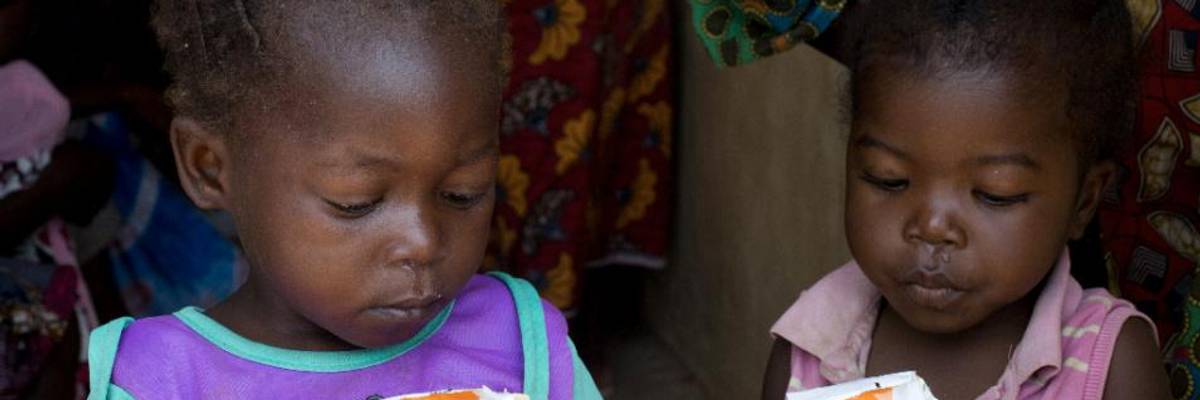Echoing previous alerts from United Nations experts and agencies, the U.N. Children's Fund warned Wednesday that an estimated 10.4 million children in the Democratic Republic of the Congo, northeast Nigeria, South Sudan, Yemen, and the Central Sahel are expected to suffer from acute malnutrition in 2021--a number that could further increase without urgent international action.
"These are all countries or regions experiencing dire humanitarian crises while also grappling with intensifying food insecurity, a deadly pandemic, and--with the exception of the Central Sahel--a looming famine," said UNICEF, as the agency is widely known, in a statement that came as the global Covid-19 death toll neared 1.8 million with a total of more than 82.2 million infections.
"For countries reeling from the consequences of conflicts, disasters, and climate change, Covid-19 has turned a nutrition crisis into an imminent catastrophe," said Henrietta Fore, UNICEF's executive director. "Families already struggling to feed their children and themselves are now on the brink of famine. We can't let them be the forgotten victims of 2020."
UNICEF, which has appealed for over $1 billion to support child nutrition programs in countries affected by humanitarian crises next year, projects that 3.3 million children under five in the Democratic Republic of the Congo will suffer from acute malnutrition in 2021, including at least one million with severe acute malnutrition--the "most extreme and visible form of undernutrition."
"Children with severe acute malnutrition have very low weight for their height and severe muscle wasting. They may also have nutritional edema--characterized by swollen feet, face, and limbs," according to UNICEF, which estimates that 16 million children under the age of 5 worldwide are malnourished to that degree.
"The scale of humanitarian needs in the Democratic Republic of the Congo is staggering," the agency said. "Chronic poverty and weak essential services, recurrent armed conflict, acute malnutrition, and major epidemic outbreaks, including the Covid-19 pandemic, have all heightened the vulnerability of families."
The agency projects that next year, over 800,000 Nigerian children will suffer from acute malnutrition, including nearly 300,000 of severe acute malnutrition. More than a decade of armed conflict in the country's northeast region has caused major displacement and humanitarian needs that have been exacerbated by the pandemic, UNICEF said, "with lockdowns and other Covid-19 prevention measures disrupting the food system and impacting already weak basic service infrastructure. "
South Sudan--where the malnutrition projections for children are 1.4 million and 313,000, respectively--faces "concurrent inter-communal violence, armed conflict, cyclical drought, and perennial flooding," UNICEF explained. "Years of conflict have resulted in displacement, increasing rates of food insecurity, limited access to quality basic health and nutrition services, and poor access to water, sanitation, and hygiene."
In war-torn Yemen--the world's worst humanitarian crisis--the child malnutrition estimates for 2021 are more than two million and nearly 358,000. "Protracted armed conflict, widespread economic collapse, and a breakdown in national systems and services has left 12.4 million children in need of humanitarian assistance," according to UNICEF. Now, as the pandemic rages on, "millions of parents are being left to make the gut-wrenching choice between food and medical care for their children."
Meanwhile, "in Central Sahel countries of Burkina Faso, Mali, and Niger, worsening conflict, displacement, and climate shocks could take the total number of malnourished children to a staggering 2.9 million, including 890,000 children suffering from severe acute malnutrition," UNICEF said Wednesday.
Earlier this month, while accepting the Nobel Peace Prize on behalf of the U.N. World Food Program (WFP), executive director David Beasley said that "because of so many wars, climate change, the widespread use of hunger as a political and military weapon, and a global health pandemic that makes all of that exponentially worse--270 million people are marching toward starvation."
Writing for The Guardian's opinion section on the same day that he accepted the prize, Beasley warned: "We are losing the battle against hunger as never before. And we are losing it most in Yemen... What is happening in Yemen now is a shame. We all share that shame and we need to end it together."
In November, the WFP joined with the International Organization for Migration (IOM) to issue a first-of-its-kind report entitled Populations at Risk: Implications of Covid-19 for Hunger, Migration, and Displacement (pdf). At the time, Beasley explained that "the socio-economic impact of the pandemic is more devastating than the disease itself."
"Many people in low- and middle-income countries, who a few months ago were poor but just about getting by, now find their livelihoods have been destroyed," he said. "Remittances sent from workers abroad to their families at home have also dried up, causing immense hardship. As a result, hunger rates are sky-rocketing around the world."
The WFP and IOM's report offers recommendations, which include ensuring migrants in need can access humanitarian assistance; recognizing positive contributions of migrants and diaspora, and promoting their inclusion in social protection systems; countering xenophobia, stigmatization, and discrimination; and facilitating the flow of remittances as part of pandemic response and recovery.




